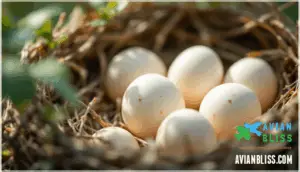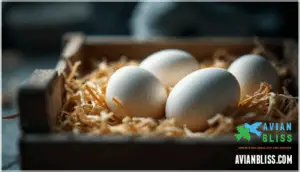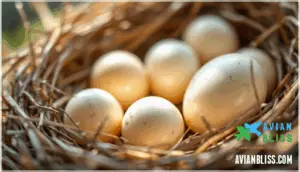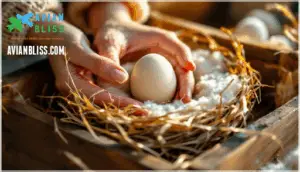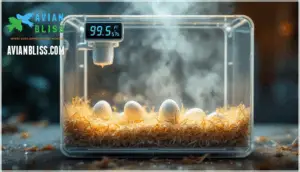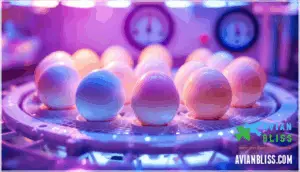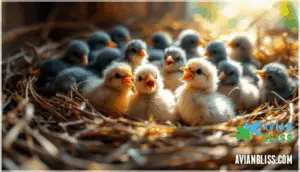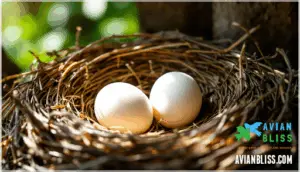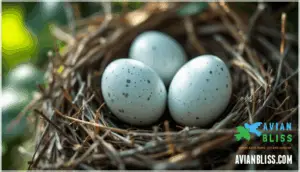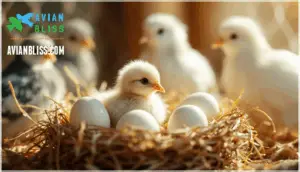This site is supported by our readers. We may earn a commission, at no cost to you, if you purchase through links.

Most pigeon eggs remain viable for 7 to 10 days if stored properly, though some hardy specimens have hatched after two weeks of patient waiting. Temperature swings, humidity shifts, and even how you position the egg all play critical roles in whether that tiny life inside survives the delay.
Understanding these survival factors helps you make smart decisions when you’re managing breeding pairs, dealing with abandoned nests, or preparing eggs for fostering or artificial incubation.
Table Of Contents
- Key Takeaways
- Pigeon Egg Survival Without Incubation
- How Long Can Pigeon Eggs Survive Unincubated
- Storing Unincubated Pigeon Eggs Safely
- Incubation Time and Pigeon Egg Development
- Fostering Pigeon Eggs and Hatchlings
- Artificial Incubation for Pigeon Eggs
- Caring for Pigeon Hatchlings
- Pigeon Egg Incubation and Hatching Process
- Factors Affecting Pigeon Egg Incubation and Hatching
- Tips for Successful Pigeon Egg Incubation and Hatching
- Frequently Asked Questions (FAQs)
- How long do pigeon eggs last without incubation?
- What happens if pigeons get sick during incubation?
- Do pigeons incubate their eggs?
- How long do pigeons sit on their eggs?
- Do pigeons lay eggs without mating?
- Do pigeon eggs need to be refrigerated?
- How long can eggs be left unincubated?
- How long can bird eggs survive without heat?
- What do pigeons do with eggs that don’t hatch?
- What happens to unhatched pigeon eggs?
- Conclusion
Key Takeaways
- Pigeon eggs stay viable for about 7 to 10 days without incubation when stored properly at 53–59°F with 75–85% humidity, though hatchability drops sharply after the first week.
- Temperature stability and humidity control matter most—eggs positioned blunt-end-up at a 45-degree angle and turned daily maintain better viability than those left stationary or stored incorrectly.
- After 10 days of storage, embryo mortality jumps dramatically as blastoderm cells die off, with hatching success rates plummeting from 80% to below 50% and approaching zero by day 14.
- Fostering abandoned eggs with experienced pigeon pairs or using artificial incubation (maintaining 99–99.5°F and 55–60% humidity for 17–19 days) gives unincubated eggs their best chance at successful hatching.
Pigeon Egg Survival Without Incubation
If you’ve found a pigeon egg sitting alone, you’re probably wondering how much time you have before it’s too late. The good news is that pigeon eggs are surprisingly resilient for a short window, but that window closes faster than you might think.
Let’s look at what affects their survival, how to store them properly, and what happens when incubation gets delayed.
Factors Affecting Unincubated Egg Survival
When unincubated pigeon eggs face the clock, survival depends on several critical factors. Temperature stability tops the list—eggs stored below 16°C or above 20°C lose viability fast.
Here’s what influences pigeon egg survival before incubation begins:
- Storage Temperature – Keep eggs at 53–59°F to prevent embryo damage
- Humidity Levels – Maintain 75–85% humidity to avoid shell drying
- Egg Handling – Minimize touching to reduce bacterial contamination
- Genetic Factors and Parental Health – Strong parent birds produce hardier eggs
These factors affecting egg survival determine whether your rescue effort succeeds or fails. Specifically, white light stimulation can improve hatching performance.
Ideal Storage Conditions for Unincubated Eggs
To store unincubated pigeon eggs safely, you’ll need the right setup. Keep them at 53–59°F with humidity between 75–85%. Position eggs at a 45-degree angle, pointed end down—this prevents the yolk from sticking to shell membranes. Turn them gently once daily to maintain even nutrient distribution.
Temperature stability and humidity control are your best friends here. Storage duration matters too: aim to start incubation within seven days, as hatchability drops 5–15% for each day beyond that window.
Fostering abandoned eggs under parenting racers is the best method for survival.
Risks of Delayed Incubation for Pigeon Eggs
When egg storage stretches past that seven-day sweet spot, you’re rolling the dice with some serious complications. Temperature fluctuations and humidity imbalance accelerate embryo mortality—think of the blastoderm cells dying off before they’ve even had a chance to start developing. Unincubated pigeon eggs face these specific risks of delayed incubation:
- Reduced hatchability drops from 80% to below 50% after ten days
- Embryo mortality jumps as cell death begins in the blastoderm layer
- Shell contamination increases when permeability rises over time
- Nutrient degradation occurs as yolk lipids break down after six days
- Delayed hatching extends by 8–10 hours, stressing already weakened chicks
Your egg viability takes a nosedive with each passing day, so prompt incubation protects embryo survival.
How Long Can Pigeon Eggs Survive Unincubated
You’re probably wondering just how much time you have before those unincubated pigeon eggs lose their chance at life. The answer isn’t as simple as a single number, since several factors come into play.
Let’s break down the timeframes, environmental influences, and what happens when eggs sit too long without warmth.
Maximum Time Limit for Unincubated Pigeon Eggs
Think of it like this—your window of opportunity closes fast. Pigeon egg survival without incubation drops dramatically beyond the viability threshold of seven days. Within that first week, you’re still in the safe zone if storage conditions are decent.
But push past day 10, and embryo degradation accelerates sharply. Studies show hatching success plummets to near zero after 14 days, even under ideal circumstances.
Temperature effects compound the problem—cells begin dying off around day 8 under typical ambient conditions. That’s your maximum time limit for unincubated pigeon eggs before fertility becomes a lost cause.
Effects of Temperature and Humidity on Unincubated Eggs
Regarding egg survival, temperature and humidity work like a tag team—mess up one, and you’re in trouble. Your unincubated pigeon egg thrives between 55% and 65% humidity paired with temperatures around 16–18°C.
Drop below 45% humidity, and dehydration accelerates through the shell, wrecking the embryo’s water reserves. Spike above 70%, and you’re inviting mold while blocking gas exchange.
Combined deviations hit hardest—high heat plus high moisture can tank embryo development by over 60%, making storage duration essential for success.
Consequences of Prolonged Unincubated Egg Storage
Patience runs thin when storing unincubated pigeon eggs too long. After seven days without warmth, embryo viability drops sharply—hatchability rates plummet by 20–40%, and you’ll see dormancy damage accumulate as blastoderm cells die off.
Push beyond ten days and egg quality deteriorates fast: the albumen weakens, shells lose moisture, and your chances hit near zero.
Mitigation strategies like cooling eggs or periodic turning help, but there’s no magic fix for prolonged storage consequences.
Storing Unincubated Pigeon Eggs Safely
If you want your pigeon eggs to make it through storage, you need to handle them the right way. The difference between a healthy hatch and a failed one often comes down to how you store these delicate eggs before incubation begins.
Let’s look at three key practices that’ll keep your eggs viable until you’re ready to incubate them.
Cool, Dry Place for Unincubated Egg Storage
You’ll want to store unincubated pigeon eggs at temperatures between 53–59°F in a spot with 70–85% humidity. Keep them away from direct light—even a few hours of bright light can raise internal temperatures by up to 4°F, speeding up unwanted chemical changes. A cool, dry basement or pantry works perfectly.
Short-term storage under ideal conditions protects viability for five to seven days, but handling best practices matter too. The maximum time limit for eggs is about ten days before fertility drops sharply, so don’t push it.
Positioning Unincubated Eggs for Optimal Development
Egg orientation is your secret weapon for keeping unincubated pigeon eggs healthy. You’ll want to position them blunt-end-up, where the air cell naturally forms—this setup boosts hatchability by up to 21% compared to sharp-end-up placement. Here’s how to nail it:
- Place the blunt end upward for best air cell access
- Tilt eggs at a 40–45° resting angle for stability
- Store in a consistent environment between 53–59°F
- Avoid inverted positioning, which cuts hatchability by 4%
- Check air cell location after 48 hours using candling
Proper egg storage with correct orientation preserves viability and sets your eggs up for success when incubation begins.
Regular Turning of Unincubated Eggs for Even Growth
Turning stored pigeon eggs isn’t just busywork—it’s essential for preventing embryos from sticking to the shell membrane. By rotating eggs at least once daily during storage, you maintain internal membrane health and avoid yolk displacement. Aim for angles between 38–42° to ensure balanced nutrient distribution, especially when storing eggs beyond seven days. This simple practice significantly reduces embryo adhesion and enhances overall egg viability.
Here’s your turning game plan:
| Turning Aspect | Recommendation |
|---|---|
| Turning Frequency | Once daily minimum during storage |
| Angle Importance | 38–42° rotation for best results |
| Storage Protocols | Combine with 12–15°C and 70–80% humidity |
| Risk Prevention | Stops membrane sticking after 7+ days |
| Viability Window | Maintains egg survival up to 10 days |
Without regular turning, hatchability can drop by up to 25% due to membrane adhesion and poor nutrient flow. Don’t skip this crucial step to ensure the best outcomes for your stored pigeon eggs.
Incubation Time and Pigeon Egg Development
Once you’ve stored your pigeon eggs properly, the next step is understanding when to start incubation. Timing matters because it affects how well the embryo develops and whether you’ll get a healthy chick.
Let’s look at what you need to know about incubation periods and how they impact your eggs’ success.
Importance of Incubation Time for Pigeon Egg Development
Think of incubation time as your egg’s lifeline—without it, embryonic development grinds to a halt. Your pigeon egg needs consistent warmth around 99.5°F for 17–19 days to reach hatching success.
Here’s what proper incubation time delivers:
- Prevents embryo death and ensures squab health
- Maintains temperature sensitivity within safe ranges (99–102°F)
- Controls humidity effects on shell moisture and development
- Fosters complete organ and skeletal maturation
- Boosts hatching success from 40% to 90% when properly timed
Skip these critical days, and you’re left with an unincubated pigeon egg that won’t survive beyond a week.
Matching Incubation Time With Foster Pair Development
You’ve provided consistent warmth—now it’s time to sync your foster pair readiness with those donor eggs. Successful fostering demands tight synchronization methods: your foster pair’s eggs must be laid within three days of the donor eggs.
This hormonal synchronization ensures crop milk production peaks right when hatching occurs. Mismatched incubation time by more than 48 hours tanks hatching success rates below 60%.
Environmental controls—stable temperature at 99.5°F and 55–60% humidity—keep egg survival on track and foster parents primed for easy acceptance.
Ideal Incubation Period for Pigeon Eggs
After syncing your foster pair timing, understanding the ideal incubation period for pigeon egg incubation becomes your next step. Your eggs need 17 to 19 days of consistent warmth, averaging 18 days for hatching success. Best duration depends on maintaining incubation temperature at 99.5°F and humidity levels between 55–60%. Parental roles—alternating day and night shifts—help the incubation process stay stable. Interruptions beyond 24 hours can crash egg development by 40%.
Watch these factors closely:
- Incubation time: 17–19 days average
- Temperature: 99–99.5°F steady
- Humidity: 55–60% for growth
- Turning: Regular shifts matter
- Hatching success: Over 90% when done right
Fostering Pigeon Eggs and Hatchlings
Sometimes you need a helping hand—or wing—to get pigeon eggs to hatch successfully. Whether you’re dealing with abandoned eggs or parents who won’t settle in, fostering offers a reliable path forward.
Let’s look at your options for giving those eggs the best chance at life.
Benefits of Fostering Pigeon Eggs and Hatchlings
Fostering offers a lifeline when pigeon eggs face abandonment or parental loss. When you place an egg with an experienced foster pair, you’re tapping into natural behaviors that artificial methods can’t replicate—crop milk production, consistent warmth, and instinctive chick care. Studies show foster-reared squabs achieve better protein efficiency ratios (2.67 versus 1.63 for some parent-reared birds), demonstrating how fostering bolsters strong growth.
Beyond individual welfare outcomes, fostering also promotes breeding optimization by letting elite pairs produce more eggs annually while experienced surrogates handle incubation duties. This approach preserves genetic diversity, reduces stress on high-performance breeders, and even has conservation applications—like Socorro doves successfully raising endangered pink pigeon chicks.
| Fostering Benefit | Impact | Example Application |
|---|---|---|
| Welfare outcomes | 65% survival rate with proper pairing | Rescuing abandoned eggs |
| Breeding optimization | 30% increased annual chick yield | Elite pair management |
| Conservation applications | 80% fledgling success in captive programs | Endangered species recovery |
Choosing a suitable foster pair requires careful synchronization—match donor and foster incubation stages within 3–4 days for best results. Behavioral adaptation improves with experience; seasoned foster parents show under 10% abandonment rates compared to 25% in first-timers.
Choosing a Suitable Foster Pair for Pigeon Eggs
The right foster pair can mean the difference between a thriving squab and a failed hatch. Your selection checklist should include:
- Cycle Synchronization – Match foster pairs within 3–4 days of the donor’s laying schedule so pigeon milk production aligns with hatching.
- Foster Experience – Experienced pairs show 20–30% higher acceptance rates and more consistent incubation patterns.
- Health Screening – Exclude any pair under stress or recovering from illness to prevent disease transmission.
- Breed Similarity – Cross-pair fostering within similar breeds reduces rejection incidents considerably.
Pair compatibility matters most during those critical first 48 hours after egg transfer.
Artificial Incubation as an Alternative to Fostering
When fostering limitations arise—unavailable pairs or mismatched cycles—artificial incubation offers a reliable safety net. Modern incubators maintain precise temperature (37.2–37.5°C) and humidity (55–60%) automatically, eliminating human error throughout the 17–19-day cycle.
You’ll see hatching success rates of 72–93% with proper setup, matching or exceeding natural incubation.
For breeding management and conservation applications, this technology permits uninterrupted monitoring and schedule control, boosting profitability by 5–20% while protecting hatchlings from predators.
Artificial Incubation for Pigeon Eggs
When foster pairs aren’t available, an artificial incubator becomes your best option for hatching pigeon eggs. You’ll need the right equipment and careful attention to detail, but don’t worry—it’s manageable even if you’re new to the process.
Let’s look at what you need to know about choosing an incubator, maintaining the right conditions, and keeping your eggs healthy throughout incubation.
Choosing The Right Incubator for Pigeon Eggs
Your incubator choice can make or break your hatch. You’ll want a forced-air model with built-in egg turning and digital temperature control that maintains 99–99.5°F consistently. Look for size compatibility—some units only fit smaller eggs, so confirm yours accommodates pigeon eggs.
Automation features like automatic turners and humidity-level monitoring reduce your workload and improve results. Tabletop models handling 1–130 eggs work well for most backyard breeders and cost $50–$1000.
Maintaining Optimal Temperature and Humidity for Pigeon Eggs
During incubation, maintaining temperature stability between 99–100°F is non-negotiable—even brief swings above 101°F or below 97°F can weaken embryos.
Your humidity control matters just as much: keep levels at 55–60% throughout, then bump to 65–70% during the final lockdown days.
Use monitoring tools like hygrometers at egg level to track conditions accurately, and choose incubator types with viewing windows to check progress without losing heat.
These ideal temperature and humidity levels directly boost your hatching success.
Turning and Monitoring Pigeon Eggs in Artificial Incubation
Turn your eggs every two hours—24 times daily to prevent embryonic adhesion and boost hatch success. Aim for angles between 38–42 degrees; anything less disrupts nutrient flow.
Automation systems with real-time monitoring keep temperature and humidity rock-solid, cutting your workload by over 90%.
Stop turning 1–3 days before hatching so chicks can position themselves correctly. Proper egg turning frequency during artificial incubation directly impacts your results.
Caring for Pigeon Hatchlings
Once your pigeon eggs hatch, the real work begins. You’ll need to create the right conditions for those fragile hatchlings to thrive.
Here’s what you need to focus on to give them the best start.
Providing a Warm Environment for Hatchlings
Newly hatched pigeons can’t regulate their own body temperature—they’re completely dependent on external warmth for survival. You’ll need to maintain a brooder temperature between 35–37°C (95–98.6°F) during those critical first five days. Safe heat sources include electric heating pads on low, infrared bulbs, or microwaveable pet heat pads that you’ll rotate throughout the day. Keep humidity levels around 55–65% to prevent dehydration, and watch your hatchlings closely for signs they’re too cold (huddling together) or overheated (panting). Proper hatchling care during this stage dramatically improves survival rates.
- Electric heating pad placed under half the brooder box
- Infrared reptile bulb (40-watt) suspended overhead
- Towel-lined enclosure to trap warmth and reduce stress
- Thermometer for constant temperature monitoring
- Covered brooder with ventilation to balance heat retention
Providing a warm environment isn’t optional—it’s the difference between thriving chicks and heartbreaking losses.
Adjusting Heat Source and Humidity for Hatchlings
You’ll need to fine-tune your heat source and adjust humidity levels as your hatchlings grow—think of it like dialing in the perfect recipe. Brooder Temperature Control starts at 37.2–37.5°C (99–99.5°F), with Safe Heat Sources like heating pads or infrared bulbs positioned to create a gradient.
Watch for Hatchling Comfort Signs: cold chicks huddle and gape repeatedly, while overheated ones turn bright pink and pant. Humidity Level Adjustment should stay between 55–60% using a hygrometer and water dish. Thermoregulation Development kicks in around day five, so you can gradually reduce heat as down feathers appear.
| Heat Source | Temperature Range | Humidity Target |
|---|---|---|
| Heating pad (low) | 37.2–37.5°C | 55–60% RH |
| Infrared bulb | 37.0–37.5°C | 55–60% RH |
| Brooder box | 37.2–37.5°C | 55–60% RH |
| Hot water bottle | 36.5–37.0°C | 55–60% RH |
Monitoring Hatchling Health and Development
Once your brooder conditions are dialed in, checking on pigeon hatchlings becomes routine.
Track these four benchmarks daily to catch problems early:
- Weight Gain – Healthy chicks add 10–15 grams per day from day four onward.
- Feather Development – Down appears by day three; flight feathers emerge around day ten.
- Crop Fullness and Fecal Consistency – A plump crop after feeding and firm droppings signal good digestion.
- Body Temperature – Normal range sits at 38–40°C; anything outside that deserves attention.
Slow progress? Time to consult your avian vet.
Pigeon Egg Incubation and Hatching Process
Once you understand the basics of keeping pigeon eggs viable before incubation, you’ll want to know what happens when nature takes its course.
The incubation and hatching process involves specific timing, environmental conditions, and parental behaviors that work together like a well-oiled machine.
Let’s look at how pigeon parents shepherd their eggs from the nest to hatching day.
Pigeon Egg Incubation Period and Hatching Time
Your pigeon eggs need around 17 to 19 days of steady incubation before hatching begins. Both parents tag-team this job—males generally handle daytime shifts while females take the night watch. This round-the-clock care keeps incubation temperature steady at 99°F to 99.5°F, with humidity levels hovering between 55% and 60%. Around day 18, you’ll notice the chick start pipping (cracking through the shell with its egg tooth). The hatching process can stretch over 24 hours as the squab works its way out.
- Parental roles matter: Continuous heat transfer from both parents prevents dangerous temperature drops that threaten embryo survival.
- Timing varies slightly: Environmental conditions and individual chick strength affect when hatching wraps up.
- Chick development peaks late: The yolk sac absorbs into the body just before emergence, fueling those critical first hours outside the shell.
Importance of Temperature and Humidity in Incubation
Getting the incubation conditions just right separates successful hatches from heartbreak. You’ll need to hold temperatures steady between 37.2°C and 37.5°C (99°F to 99.5°F)—fluctuations beyond half a degree quickly damage embryonic growth. Humidity levels matter just as much: aim for 55% to 60% during most of incubation, then bump it up to 70% to 75% during the final lockdown phase. Low humidity causes shrink-wrapped embryos that can’t pip through their shells, while excess moisture creates swollen chicks that suffocate before hatching.
| Condition | Best Range | What Goes Wrong |
|---|---|---|
| Temperature | 37.2–37.5°C | Deviations kill embryos or cause deformities |
| Humidity (Days 1–16) | 55–60% | Too low = dehydration; too high = swelling |
| Humidity (Lockdown) | 70–75% | Wrong levels = failed pipping and death |
Proper egg storage before incubation and careful monitoring prevent chilling or dehydration that wreck your hatching success.
Role of Pigeon Parents in Incubation and Hatching
Both parents split incubation duties like clockwork—males cover mid-morning to afternoon shifts, while females handle the remaining hours, including nights. This tag-team approach keeps eggs at 36.9°C to 37.2°C with barely any temperature swings. Beyond warming eggs, parents defend the nest fiercely, turn eggs regularly, and produce crop milk for newly hatched squabs. Here’s how their parental care unfolds:
- Incubation duties split between both birds, with males usually covering 10:00 to 16:00
- Temperature regulation maintained through body positioning and plumage adjustments
- Protective behaviors intensify during late incubation—expect wing slapping and pecking
- Feeding squabs begins immediately with nutrient-rich crop milk
- Hatching synchronization starts after the second egg drops, ensuring chicks emerge together
Without both parents cooperating, hatching failure rates jump to 50%.
Factors Affecting Pigeon Egg Incubation and Hatching
Getting eggs to hatch isn’t just about keeping them warm. Your pigeons’ health, the environment around them, and even the species you’re working with can all tip the scales between success and failure.
Let’s look at what really matters when you’re trying to bring those eggs to life.
Effects of Nutrition and Health on Pigeon Egg Incubation
Dietary impact matters more than you might think. If your breeding birds lack key vitamins like riboflavin or pantothenic acid, hatchability drops sharply—sometimes within just two weeks.
Egg weight tells its own story: eggs below 14 grams face less than 50% survival odds, while heavier eggs pack better nutrient reserves.
High-energy diets beyond 12.00 MJ/kg boost embryo viability and reduce laying intervals.
Parental health directly shapes egg nutrition and incubation success, making balanced avian nutrition your first line of defense for healthy chicks.
Impact of Environmental Factors on Incubation and Hatching
Even with perfect nutrition, environmental conditions can make or break your hatch. Temperature sensitivity matters most—embryos need a rock-solid 38–38.5°C during early development, and anything below 36.5°C for over six hours can spike mortality by 20–30%. Humidity effects are equally critical, since levels outside 50–65% either suffocate embryos or dry them out.
Here’s your environmental checklist:
- Temperature: Maintain 38–38.5°C with less than 0.5°C variation
- Humidity: Keep between 50–65% to prevent dehydration or oxygen blockage
- Ventilation Efficiency: Make sure airflow stays at 0.3–0.5 m/s for proper gas exchange
- Light Exposure: Use low-intensity LED light to boost hatchability by 6%
Storage conditions before incubation also count—eggs held beyond seven days lose viability fast.
Influence of Species Variations on Incubation Time
Across avian species, incubation time varies dramatically—from 11 days in tiny songbirds to 80 days in albatrosses. Pigeons generally clock 17–19 days, showing minimal breed-to-breed variation despite differences in body size. This consistency reflects genetic regulation of embryonic development rates rather than environmental sensitivity.
Parental attentiveness and stable nest temperatures keep pigeon incubation predictable, unlike passerines where latitude and climate shift timelines by 25%. Selective breeding hasn’t changed pigeon incubation periods much, proving genetics lock in the developmental clock.
| Factor | Impact on Incubation |
|---|---|
| Pigeon breeds | Minimal variation (±1 day) |
| Avian species | 11–80 days range |
| Parental attentiveness | 60% of variation explained |
| Environmental sensitivity | Low in pigeons vs. passerines |
Tips for Successful Pigeon Egg Incubation and Hatching
Getting pigeon eggs to hatch successfully isn’t rocket science, but it does take some know-how and attention to detail. Whether you’re using an incubator or helping parent birds along, a few key practices make all the difference.
Here’s what you need to focus on to give those eggs their best shot at becoming healthy chicks.
Ensuring Proper Incubation Environment and Conditions
Think of incubation like baking—precision matters. You need to maintain temperature stability between 99–99.5°F and humidity levels around 55–60% throughout the process.
Turn eggs 3–5 times daily to prevent the embryo from sticking to the shell membrane. Air circulation is key too, ensuring oxygen reaches developing chicks.
Use monitoring tools like digital thermohygrometers to track conditions precisely. When your incubation environment hits these targets consistently, you’re setting up your eggs for hatching success.
Monitoring Egg Development and Hatchling Health
You can check embryo development by candling eggs around day 4—hold them up to a bright light to spot veins and movement. This confirms viability without cracking the shell.
Track these signs of healthy development:
- Dark shadowing visible during candling by day 5, indicating active embryo growth
- Steady weight gain in hatchlings—monitor daily in the first week post-hatching
- Strong peeping sounds and movement before pipping begins around day 17
- Bright eyes and alert behavior within hours of hatching, showing good intestinal function
- Feather growth progression matching expected milestones from weeks 1–4
Watch hatchling weight trends closely—healthy squabs double their weight within the first few days when post-hatch feeding kicks in properly.
Providing Optimal Care for Pigeon Hatchlings
Your newborn squab can’t regulate its own body heat—thermal regulation depends entirely on you maintaining 31–35 °C in the brooder during those critical first seven days. Feed warmed crop milk substitute every 2 hours initially, watching for a full crop that empties daily.
House them in a quiet, partially covered box with dry bedding and 55–65% humidity. Check weight daily—healthy hatchlings gain 10–20 g after week one, signaling proper developmental stages and solid hatchling health.
Frequently Asked Questions (FAQs)
How long do pigeon eggs last without incubation?
Unincubated pigeon eggs maintain viability for roughly five to seven days when stored properly. After that window, your chances of successful hatching drop considerably—viability factors like temperature effects and humidity impact start working against you, accelerating embryo mortality with each passing day.
What happens if pigeons get sick during incubation?
Parental illness disrupts incubation consistency, causing temperature drops and reduced nest attendance that can kill embryos within hours. Sick pigeons may abandon eggs entirely, while vertical transmission of diseases like Paramyxovirus threatens egg health directly.
Intervention strategies like artificial incubation become essential.
Do pigeons incubate their eggs?
Yes, pigeons absolutely incubate their eggs—it’s a true team effort. Both parents take turns sitting on the eggs, with males generally covering noon to evening shifts and females handling the overnight watch.
They start incubating after laying their second egg, keeping temperatures steady between 99–102°F for about 18 days until hatching.
How long do pigeons sit on their eggs?
Pigeons usually sit on their eggs for about 17 to 19 days until hatching.
Both parents share incubation duties, with males covering daylight hours and females taking the overnight shift, maintaining nearly constant warmth throughout the incubation period.
Do pigeons lay eggs without mating?
Here’s an egg-cellent fact: female pigeons don’t need a mate to produce eggs. Hormonal triggers prompt egg laying every 25–28 days, even in unmated females or female pairing situations.
However, these unfertilized eggs won’t hatch since pigeon egg fertility requires male fertilization for embryonic development.
Do pigeon eggs need to be refrigerated?
Refrigeration isn’t recommended for pigeon eggs you plan to hatch. Temperatures below 7°C can cause chilling damage that kills embryos within 48 to 72 hours.
Instead, store eggs at 8–12°C with 70–75% humidity in a cool, dry spot. This ideal storage condition preserves hatchability without triggering early development or freezing damage.
How long can eggs be left unincubated?
Like a ticking clock on freshness, unincubated pigeon eggs maintain viability for about seven days under proper conditions. Store them between 13–18°C with 75–85% humidity, turning twice daily to prevent yolk adhesion.
Beyond this timeframe, hatchability decline accelerates dramatically—embryo mortality exceeds 80% after one week. Temperature effects and humidity impact are critical; deviations compromise egg survival without incubation, making storage methods essential for preserving these delicate potential lives.
Beyond seven days without incubation, pigeon egg mortality exceeds 80% as temperature and humidity deviations destroy fragile embryos
How long can bird eggs survive without heat?
Without consistent warmth, most bird eggs face a ticking clock—viability after chilling drops fast.
Pigeon eggs show decent egg cold tolerance, surviving five to seven days unincubated if you store them cool (55–65°F) and dry. Hatchability window narrows daily, though, as embryonic diapause can’t last forever without proper incubation.
What do pigeons do with eggs that don’t hatch?
When nature closes one door, it opens another—and pigeon parents know this instinctively.
After sitting on unhatched eggs for 18 to 23 days, pigeons generally abandon them once they sense no embryo movement inside, preventing resource depletion and allowing breeding cycles to resume with fresh energy.
What happens to unhatched pigeon eggs?
Unhatched eggs face a tough reality. If they contain embryos that died early, bacterial decomposition begins within 48–72 hours after the normal 18-day window ends.
Fungal contamination spreads quickly, threatening future clutches and attracting pests. You’ll want to remove abandoned eggs promptly to keep the nest safe.
Conclusion
The difference between a viable pigeon egg and a lost opportunity can literally come down to hours. Now that you understand how long a pigeon egg survives unincubated—usually seven to ten days under ideal conditions—you’re equipped to act quickly when nature throws you a curveball.
Whether you’re storing eggs for fostering, setting up an incubator, or simply monitoring a nest, temperature control and proper positioning aren’t just recommendations—they’re lifelines for those fragile embryos waiting to hatch.
- https://theworldsrarestbirds.com/how-long-does-a-pigeon-egg-survive-unincubated/
- https://www.pigeons.biz/threads/how-long-pigeon-eggs-can-survive-without-mum-or-dads-warmth.62931/
- https://www.sciencedirect.com/science/article/pii/S003257911930656X
- https://extension.msstate.edu/publications/the-avian-embryo
- https://www.pigeonracingpigeon.com/whats-new/embryonic-death-in-racing-pigeons/

